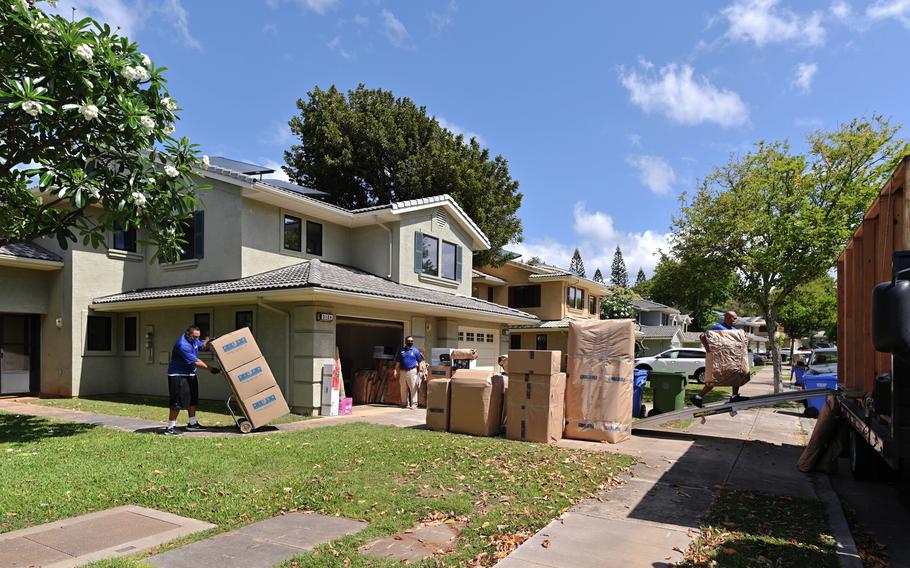
The Military Family Advisory Network has recommended the Pentagon review how frequently military families are required to move because of the financial strain that it can put on troops. (U.S. Navy photo )
An advocacy group on Wednesday is calling on the Defense Department to review how frequently it moves troops to new duty stations after survey results showed the moves impact the financial and emotional wellbeing of military families.
The Military Family Advisory Network, known as MFAN, found most families incur between $500 and $1,000 in expenses during a military move that are not reimbursed. The survey also showed families can spend up to two months in temporary lodging while they look for a house off base or wait for a home to open on base. Half of the families who participated in the survey said finding new housing is difficult or very difficult and when they end up in a home off base, more than half of them are spending at least $250 more than their monthly stipend for rent or mortgage and utilities.
“We have to help people get to a place where these transitions are a little bit easier for them,” said Shannon Razsadin, CEO of MFAN.
These financial stressors created by moving have a trickle-down effect to other issues identified by the survey results such as not having enough food and spouse employment, she said.
The 2023 Military Family Support Programming Survey is conducted every other year with the goal of understanding the experiences of military families and what isn’t working in support of the unique challenges that military service places on families. The survey specifically looks at the mental and physical health of families, housing and the ability to plan for education, financial stability and the transition into civilian life.
Two other recommendations from the survey call for the Defense Department to review compensation for troops and for the Pentagon to create a military family experience office similar to one established within the Department of Veterans Affairs.
Nearly 10,150 people responded to the survey. About 39% identified themselves as the spouse of an active-duty service member, and 11% said they were an active-duty service member.
This was the first year that the survey asked about temporary lodging at new duty stations after hearing anecdotally from families that the time it took to find housing was getting longer, Razsadin said.
While most people, 33%, said they stayed in temporary lodging for less than 10 days, 29% said they needed it for 11 to 30 days and 20% said they needed it for 31 to 60 days.
Meanwhile, questions about housing allowances and the cost of housing showed service members are spending more out-of-pocket to live than they have in the past, Razsadin said.
The housing burden scale used by the Department of Housing and Urban Development is a federal standard that labels housing costs a burden when it takes 30% or more of a household income and a severe burden when it tops 50% of income. The MFAN survey found 80% of families face a housing burden. Just 20% said they can comfortably afford rent and utility payments.
“Those are also significant issues that we need to really look at. It’s important for us to remember the military is a microcosm of the broader population, but there are nuances that make it really hard,” Razsadin said.
Duty-station moves for military families on average happen every 2½ years, and they must find a new home every time they do. Revisiting the necessity of those moves could help families get expenses under control, she said.
One area of housing that shows improvement is the family perception of on-base housing, particularly housing that is managed by private companies. In the last four years, the Defense Department and Congress have worked to mitigate some of the dangerous conditions some families faced in military family housing, such as mold, rodent infestations and lead paint exposure.
The MFAN survey found in 2014 and 2017 that it was a lack of housing that ranked as the top reason for not choosing to live on base. In 2019 and 2021 that changed to poor housing conditions. This year, availability returned as the top reason to live off base with poor conditions dropping to No. 3.
Satisfaction with maintenance response times has been better, but there is still room for improvement, Razsadin said.
One major reform to military family housing was a tenant bill of rights, which afforded residents quality standards and a path for dispute resolution.
However, MFAN found less than half of families surveyed knew about the bill of rights.
“Many of us are advocating at the [Defense Department] level, but where the real impact happens is when it makes it down to the installation level,” she said. “It’s a communication challenge.”